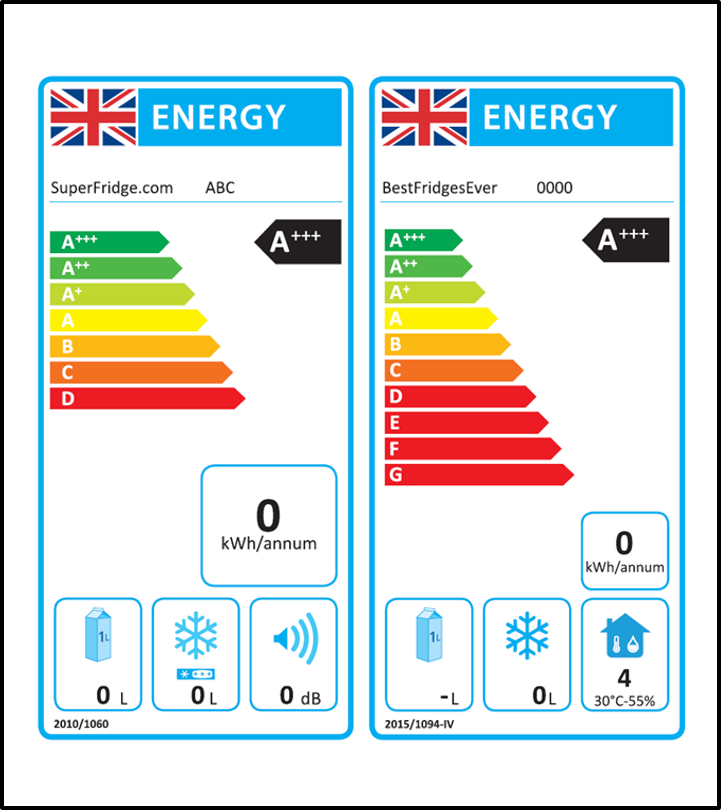Eco-design, energy labelling and Brexit, what you need to know

The UK has left the EU and at the end of 2020 we come to the end of the year long transition period. What does this mean for eco-design and labelling regulations in the UK?
Up until the end of the transition period there is no change to what manufacturers and suppliers must do. If relevant they must list products on the European product database for energy labelling (EPREL). Any re-classification of energy labels that was already scheduled must be applied.
Legislation already exists to ensure that existing minimum energy performance standards (MEPS) and energy labels remain enforceable after the transition period (The Ecodesign for Energy-Related Products and Energy Information (Amendment) (EU Exit) Regulations 2019). However, after 1 January 2021 these rules can change as the UK can apply different rules. The Department for Business, Energy and Industrial Strategy (BEIS) has recently published advice on what happens after 1 January 2021 (click here to link to web site). BEIS made a commitment that the ‘UK will uphold common high product standards wherever possible and appropriate, or even exceed them where it is in the UK’s interest to do so’ which indicates that the UK is unlikely to move away from eco-design and labelling and may even apply more stringent rules.
Due to the Northern Ireland Protocol there are differences in how eco-design and labelling is currently structured in the UK (England, Wales, Scotland and Northern Ireland) and GB (England, Wales and Scotland). However, this could change if there is a deal agreed between the UK and Europe. Curently there are some changes to what UK companies need to provide. From 1 January 2021 products placed on the GB market must have energy labels that only contain English language text and bear a UK flag rather than the EU flag (see picture above). QR codes (where provided) must link to the product information sheet on a publicly accessible website. Products placed on the UK market (from inside the UK or outside) must comply with these requirements. For products from the UK placed on the market in the EU then companies must comply with the EU eco-design and labelling requirements.
In terms of the EPREL there will be no change to what the consumer can see in the ‘open’ part of the database. However, GB market surveillance authorities will no longer have access to the ‘closed’ part of the database (a decision is pending on whether Northern Ireland’s Market Surveillance Authority will have access to the ‘closed’ part). GB suppliers will not need to input relevant information onto the EPREL database (if they sell in GB). If selling outside of GB suppliers will need to access the EPREL via an authorised representative or importer based in the EU. For businesses in Northern Ireland they will fall under the Northern Ireland Protocol and will continue to follow EU eco-design and energy labelling rules to place products on the GB, NI or EU markets.
Legislation is being prepared to ensure that eco-design and labelling requirements cover products which are not part of EU regulations before 1 January 2021, or for which EU regulations will be updated after 1 January 2021. This comprises: The Ecodesign for Energy-Related Products and Energy Information Regulations 2021. BEIS are currently consulting on the new UK regulations (click herer to link to web site). This includes household refrigeration and commercial refrigeration (refrigerating appliances with a direct sales function). Comments have to be submitted by 11 November 2020. In terms of commercial refrigeration, the UK Government is not proposing to exceed the requirements prescribed in EU regulations or the date of implementation (March 2021). They do, however, ask in the set of questions whether better eco-design and labelling regulations could be set in the future in the UK, indicating that the UK may not necessarily follow the EU lead.
Control and enforcement activities in the UK will continue as normal. These are carried out for eco-design by the Office for Product Safety and Standards (OPSS). The OPSS with Trading Standards (in GB) and the Department for the Economy (in NI) police energy labelling. The OPSS publishes documents on their enforcement policy (click here to link to web site). This provides information on what can happen when a non-compliance is identified. Although prosecution is an option, the OPSS state that they are more likely to consider advice, guidance or a warning letter to be appropriate where:
- The business has a good record of compliance.
- The business has acted in good faith, demonstrating a commitment to compliance.
Therefore, ensuring that products are correctly labelled and that you have evidence of a robust compliance procedure is essential. Evidence gained through independent testing or witness testing are obvious methods to prove compliance and are areas where RD&T can assist manufacturers and suppliers.
If you would like help with any refrigerated product eco-design or labelling issues then please contact us at RD&T (j.a.evans@rdandt.co.uk).